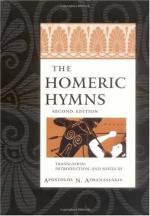The humour of the Hymn is rather rustic: cattle theft is the chief joke, cattle theft by a baby. The God, divine as he is, feels his mouth water for roast beef, a primitive conception. In fact, throughout this Hymn we are far from the solemn regard paid to Apollo, from the wistful beauty of the Hymn to Demeter, and from the gladness and melancholy of the Hymn to Aphrodite. Sportive myths are treated sportively, as in the story of Ares and Aphrodite in the Odyssey. Myths contained all conceivable elements, among others that of humour, to which the poet here abandons himself. The statues and symbols of Hermes were inviolably sacred; as Guide of Souls he played the part of comforter and friend: he brought men all things lucky and fortunate: he made the cattle bring forth abundantly: he had the golden wand of wealth. But he was also tricksy as a Brownie or as Puck; and that fairy aspect of his character and legend, he being the midnight thief whose maraudings account for the unexplained disappearances of things, is the chief topic of the gay and reckless hymn. Even the Gods, even angry Apollo, are moved to laughter, for over sport and playfulness, too, Greek religion throws her sanction. At the dishonesties of commerce (clearly regarded as a form of theft) Hermes winks his laughing eyes (line 516). This is not an early Socialistic protest against “Commercialism.” The early traders, like the Vikings, were alternately pirates and hucksters, as opportunity served. Every occupation must have its heavenly patron, its departmental deity, and Hermes protects thieves and raiders, “minions of the moon,” “clerks of St. Nicholas.” His very birth is a stolen thing, the darkling fruit of a divine amour in a dusky cavern. Il chasse de race. {39}
THE HYMN TO APHRODITE
The Hymn to Aphrodite is, in a literary sense, one of the most beautiful and quite the most Homeric in the collection. By “Homeric” I mean that if we found the adventure of Anchises occurring at length in the Iliad, by way of an episode, perhaps in a speech of AEneas, it would not strike us as inconsistent in tone, though occasionally in phrase. Indeed the germ of the Hymn occurs in Iliad, B. 820: “AEneas, whom holy Aphrodite bore to the embraces of Anchises on the knowes of Ida, a Goddess couching with a mortal.” Again, in E. 313, AEneas is spoken of as the son of Aphrodite and the neat-herd, Anchises. The celebrated prophecy of the future rule of the children of AEneas over the Trojans (Y. 307), probably made, like many prophecies, after the event, appears to indicate the claim of a Royal House at Ilios, and is regarded as of later date than the general context of the epic. The AEneid is constructed on this hint; the Romans claiming to be of Trojan descent through AEneas. The date of the composition cannot be fixed from considerations of the Homeric tone; thus lines 238-239 may be a reminiscence of




